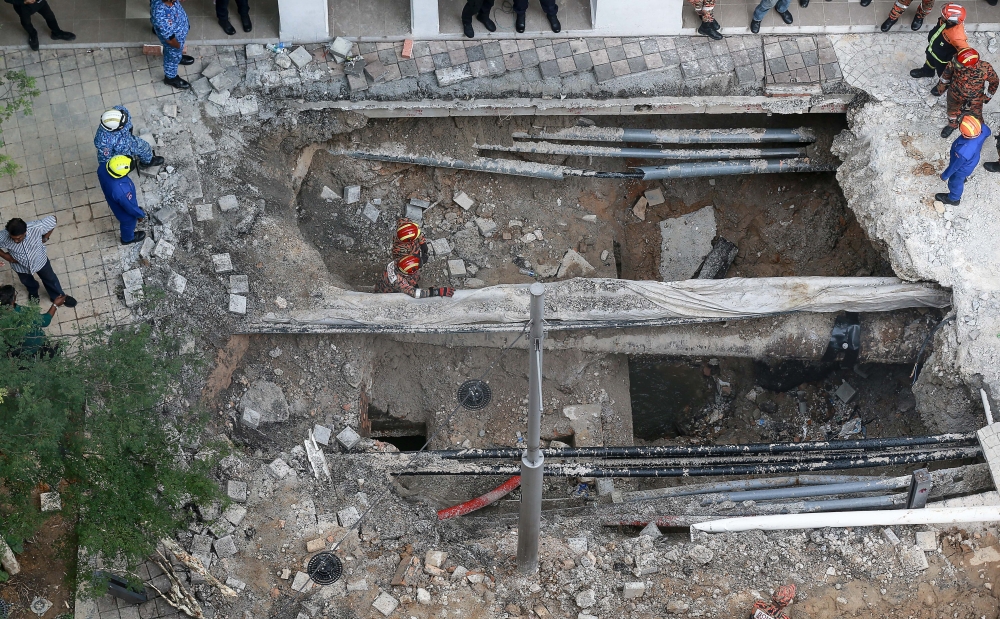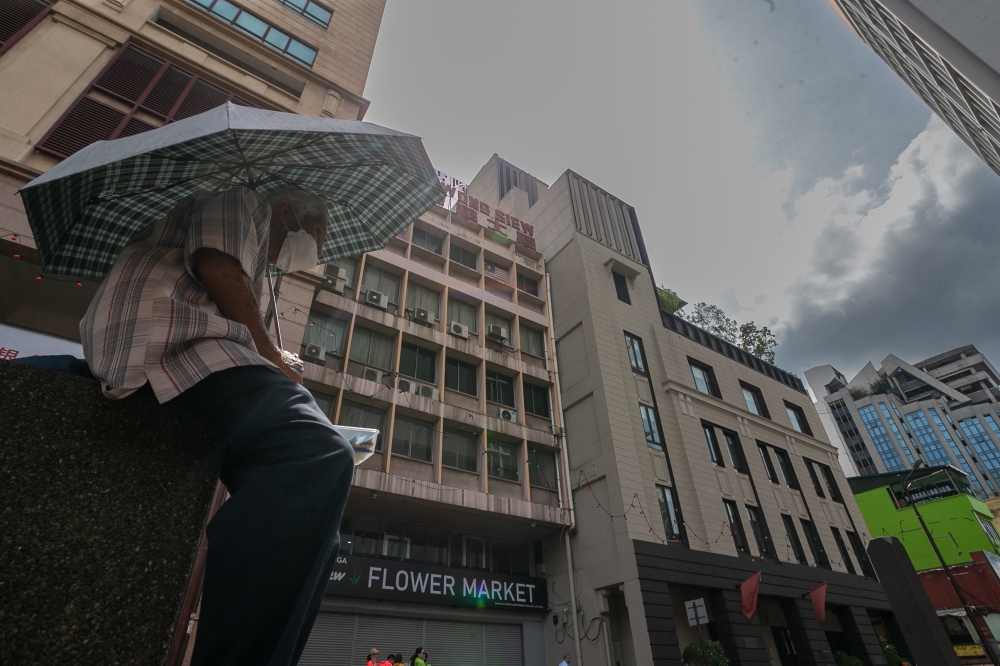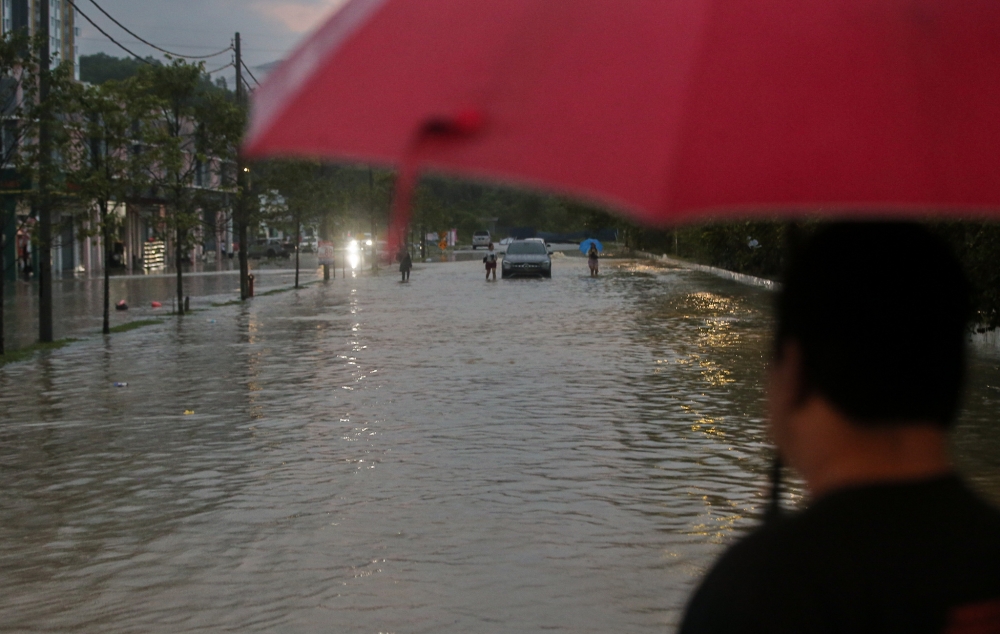KUALA LUMPUR, Oct 12 — For most, a sunny morning after days of rain and thunderstorms brings a sense of relief, offering a chance to enjoy outdoor activities uninterrupted.
However, for an Environmental Studies student at a local university, who prefers to be known as Mariam (not her real name), the clear skies bring no comfort — only anxiety that these unsettling weather events are far from over.
Her uneasiness arises from a recent thunderstorm that caused trees to fall in the city centre, reminding her of a nerve-wracking experience when she had to walk through heavy rain and a thunderstorm to reach the nearest LRT station after class.
During the intense heatwaves from March to May this year, Mariam found herself sleepless, kept awake by the oppressive heat and thoughts of the worsening climate crisis.
“I sometimes feel hopeless when I read about how our planet is deteriorating-disasters like flash floods, heatwaves, and air pollution seem to be happening everywhere, mostly due to human activities like open burning and the use of fossil fuels.

“Unplanned development, which severely damages the environment, also makes me anxious. The sinkhole incident at Jalan Masjid India last August, for example, has made me fearful of walking down the street, fearing I might step into a sinkhole,” she told Bernama.
On Aug 23, a sinkhole in the area swallowed up 48-year-old Indian tourist Vijayaletchumy, who was walking near Malayan Mansion when it appeared.
What Mariam is experiencing is eco-anxiety, also known as climate anxiety — a condition where individuals become increasingly distressed about the future due to the impacts of climate change.
According to Google’s data from November 2023, global searches related to “climate anxiety” or “eco-anxiety” surged by 4,590 per cent between 2018 and 2023.
The two most frequently Googled questions were “What is eco-anxiety?” and “How to deal with climate anxiety?”
A December 2022 national study by the Yale Programme for Climate Communication revealed that 64 per cent of Americans were at least somewhat concerned about global warming and climate change.
Dr Britt Wray, from Stanford University’s Community-Minded Interventions For Resilience, Climate Leadership and Emotional Wellbeing (CIRCLE) at Stanford Psychiatry, said that climate anxiety should not be dismissed as overreacting or catastrophising, but rather recognised as a healthy response to a real existential threat. However, she also noted that action alone is not a cure.
“Even those of us who work on climate issues everyday still grapple with these feelings.
“As more people become aware of the climate crisis and the emotional dominos that follow, the demand for resources and support continues to grow,” she said during her talk ‘Leveraging Emotions: Eco-Anxiety, Planetary Health Action, and the Power in Feelings’ at the 2024 Planetary Health Summit and 6th Annual Meeting plenary session in April.
Wray, also the creator of Gen Dread, a free newsletter focused on building resilience and meaningful action in the face of climate grief, spoke about the intense pressure faced by frontline climate and planetary health professionals.
“The stress for those on the frontlines is immense. There’s a sense of urgency to act and prevent harm, coupled with a deep moral responsibility.
“...Yet, it often feels like no matter how much we do, it’s never enough, and we know the worst is yet to come,” she said.
She suggested several resources to help navigate the emotional complexities of climate issues, one of which is to reframe concern for the climate crisis as a source of connection, even though it can often feel isolating.
Many people are eager for more open, meaningful discussions on the topic and for creating communities around solutions,” she said.
“In fact, we often sit in silence with our difficult eco-emotions. Authentic conversations about how we’re feeling, in a space where those emotions are welcomed, can be both comforting and empowering, while also unleashing creativity.
“Sometimes, you just need to express your climate-related feelings with others who understand,” she added.
She also noted that it might be a good time to seek out a climate-aware therapist if individuals find themselves feeling depressed, anxious, or overwhelmed by the climate crisis.
“Another helpful way to cope with climate emotions is to understand how they manifest in people’s lives.
“By listening to stories about how others are integrating these tough feelings into their daily experiences and using them for greater meaning and action, we can feel less alone-and perhaps even inspired and energised,” she said.

Monash University Malaysia Environmental Psychology expert Dr Ooi Wee Liam said however in Malaysia, eco-anxiety is less likely to be at the forefront of a fair number of Malaysians’ minds for now as the general awareness of how climate change affects Malysia is fairly low.
“This is because the changes in Malaysia’s climate are not as erratic as those in the global North,” he said.
“While worsening, events like heatwaves and air pollutions would more likely be linked to stress and anxiety, stemming from the discomfort and physiological responses (e.g. disrupted sleep) they may experience during these events, not eco-anxiety.
“This is because eco-anxiety is a form of anxiety that relates more to concerns and uncertainty surrounding climate change and its potential effects on oneself. Some Malaysians may be unaware that the increased and worsening occurrences of these climate events in the country are due to climate change or environmental degradation,” he told Bernama in an email interview recently
Ooi acknowledged that there have been signs of a shift this year. Heatwaves in Malaysia have lasted longer and become more intense than in previous years, particularly affecting vulnerable communities that may struggle to cope with the intensifying heat.
“In communities where they cannot manage or escape the heat and air pollution (e.g. no air-conditioning), the situation can be more detrimental to them because the discomfort lasts for most of the day and for extended periods of time. This puts them at a higher risk of experiencing mental health issues.
“The constant discomfort they face increases their stress levels, making them more irritable or agitated during heatwaves,” he noted.
On March 26, almost half of peninsular Malaysia has been experiencing peaks of at least 35 degrees Celsius for three straight days, according to the Meteorological Department, which expects the hot and dry spell to last until mid-April.
The extreme heat has led to the death of a 22-year-old from heatstroke, heightened the risk of water shortages, and caused severe loss of yields on farms.
Ooi said few studies have shown that after natural disasters or extreme events, such as floods, people have reported worsening levels of mental health — including stress, anxiety, and depression.
“These events have also been linked to PTSD (post-traumatic stress disorder), as floods are considered traumatic experiences-causing economic losses, fear of death, and both short- and long-term impacts on well-being,” he said.
Globally, the connection between climate change and psychosocial wellbeing (I.e. physical and mental wellbeing), has been discussed within the health frameworks of emergency and disaster management, particularly in extreme weather conditions.
However, a study conducted by Institut Masa Depan Malaysia (MASA)’s Policy Development Programme (MPDP) indicated that there has been no research on how to influence policy or what form the policy should take in strengthening the community’s mental capacity to cope with climate impacts.

The study also mentioned that for instance, while the Malaysian National Policy on Climate Change acknowledges that the effects on climate change could affect human wellbeing and the environment. Nevertheless, the policy does not explicitly mention mental health.
Echoing these findings, Ooi highlighted that the attention to the effects of climate change on mental health are on the rise globally, but very few exist locally.
“Hence, it is time for us to focus on how climate change events and disasters can impact not only physical health but also mental health,” he said. — Bernama



















